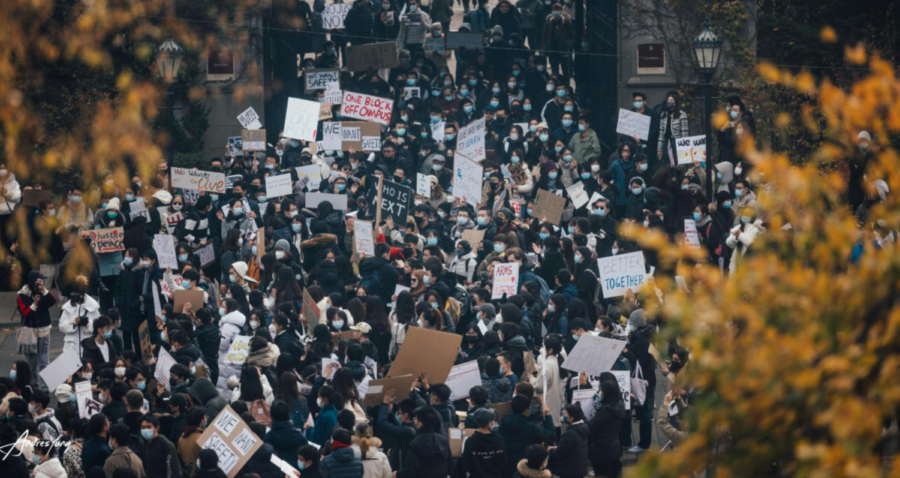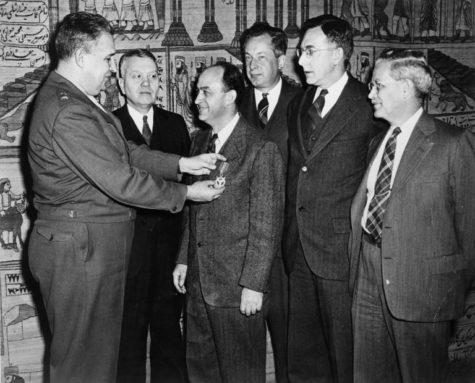In 2021, grief, anger, and protest swept campus in the aftermath of the deaths of Yiran Fan and Shaoxiong “Dennis” Zheng, two Chinese graduate school students who lost their lives to Hyde Park gun violence within 11 months of each other. Though they passed more than a year ago, the international community continues to mourn while navigating their complex relationship with campus safety and security.
The deaths of Fan and Zheng sparked several activist efforts by students on campus, including the “We Want Safety” rally on the main quad in November 2021, organized by a group of Chinese international students and attended by over 300 students, faculty, alumni, and community members. Participants held posters bearing slogans such as “arms for hugs,” “we are here to learn not die,” and “third student,” referencing Fan, Zheng, and Max Solomon Lewis, another UChicago student who died in a shooting in 2021.
For Chinese transfer student Cheng Zeng, these tragedies deeply affected him and his academic path. Zeng, who transferred in 2020 from UC San Diego, said, “After I transferred here, I took a gap year after that, and the two [shooting] incidents kind of acted as a catalyst for that decision because when it happened, I was so emotionally paralyzed. It made me think that maybe the public safety issue in Chicago and the Hyde Park community was far worse than I was originally expecting.”
In response to the three incidents and community outrage, the University implemented a series of safety and security initiatives, as outlined in the Department of Safety and Security’s 2021 annual report. These initiatives included the launch of the Lyft Ride Smart at UChicago program, the expansion of the Safety Ambassador program to include neighboring communities within UCPD’s patrol area, and new residential security assessments offered by UCPD in an effort to reduce off-campus residential risks. The University did not respond to The Maroon’s request for the unpublished 2022 annual report.
Many campus organizations, such as the Chinese Students and Scholars Association (CSSA), played a major role in advocating for improved campus safety in the immediate aftermath of Zheng’s passing. Combining feedback from students, alumni, and parents, the CSSA drafted and submitted a petition to the University in November 2021 following the death of Zheng. The main objectives of their petition included improving the coverage, hours of operation, and frequency of all campus shuttles, increasing frequency of UCPD patrol around campus, expanding access to student dining and housing over breaks, annual mandatory safety education and training programs for students, and a safety oversight committee composed of current students, parents, alumni, and leaders of Chicago communities to “oversee the measures taken by the University on campus safety and security.” Many of these initiatives appeared in the 2021 report.
“I’m actually pretty proud of what came [from the petition]. We talked about increasing school shuttles, the Lyft Pass Program, and UCPD patrols—not just patrolling more frequently or more broadly but focusing on areas near student apartments. We have seen changes after these suggestions,” CSSA president and fourth-year Kuangfu Deng said. “For example, I always walk through Regent’s Park to meet my friends, and at night there are usually UCPD walking around during that time.”
Though Deng appreciates the visible changes that have been made, he still believes that there is a lack of transparency and communication from University administrators to students regarding crimes around campus and safety measures that they are working to implement. “Every time something happens, UCPD or the University says they will implement changes and work harder to ensure safety, but there is no follow up or communication afterwards. We want to have a safety committee to directly communicate with University officials to ensure that they are actually working on these goals,” Deng said.
Not all the suggested changes from the Chinese international community were supported by the wider community. The move to increase UCPD’s presence was opposed by groups such as #CareNotCops (CNC). In a statement to The Maroon, CNC said: “We reject calls for more policing and the prioritization of ‘student safety’ over the safety of our Black neighbors. Our campus and the surrounding neighborhoods are already flooded with police, but we are still unable to prevent these gun violence tragedies from occurring. We believe that true safety can only come through dismantling racist systems like the UCPD, investing in community-led initiatives to end gun violence like the GoodKid MadCity Peacebook, and beginning the process of reparation for Black communities on the South Side. We must work together to build true safety for everyone affected by violence in our communities.”
Zening Ge, director of UChicago’s Center in Beijing, offers an explanation as to why the Chinese international community supports increased police forces. According to Ge, this divide in views has less to do with race and more to do with a fundamental cultural difference that leaves the international community “genuinely scared.” Ge commented that the “frustration [with the lack of safety] was not really toward the certain ways or a certain group. It’s actually toward the whole ecosystem or criminal justice system in the U.S. or Chicago.”
Ge wants the local community to understand that Chinese students come from a different socio-environment where police presence is less controversial. “Mainland China is a total difference in society. It’s over-surveilled, over-policed, and over-monitored…it’s just a totally different perception,” Ge said.
Kelly Hui, third-year and member of CNC, sympathized with international students who were unfamiliar with the American criminal justice system. “As a Chinese American, I really empathize with the grief, vulnerability, and fear that the international student community felt as a result of the tragic losses last year. It’s especially hard and scary for those new to the United States. When you haven’t necessarily learned about how American policing systems are so rooted in anti-Blackness and white supremacy, the UCPD can seem like a good solution to this fear. But the UCPD has not only failed to provide safety, it has actively created harm and violence on and off campus. I just hope that we can come together to recognize that, at the end of the day, we all just want to feel safe in our communities. And more policing won’t give us that.”
Ge admits that campus safety is not a problem that can be solved overnight or simply through increased police presence. “Safety is a historic issue,” Ge says. “We basically carry the historical burden with us. I think the new [University] leadership realizes that…through engaging with our local community leaders and trying to understand the root cause.”
Both the international community and anti-UCPD student groups acknowledge that mutual understanding is the first step in bridging perspectives and helping both sides unite and work together toward their common goal. In a statement to The Maroon, Pratiti Deb, an international graduate student and member of anti-gentrification advocacy group University of Chicago Against Displacement said: “The international student community is not a monolith in terms of identity or values, so I do not think anyone in the University administration can speak for all of us on our views on policing. As an international student from India, […] I think our position as Asian international students is often talked about in ways that uphold the harmful and anti-Black myth of the model minority, but as guests in the Hyde Park community, we can choose instead to build solidarity with our neighbors across the South Side.”














